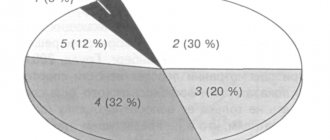A stingy person is a poor person
What is curious is that the material goods that a stingy person has are of no use to him or others. As Deon Say said, while a frugal person does not want to waste anything, a frugal person does not want to spend anything at all. He won’t buy himself a luxury apartment, a luxury car, won’t go on a trip, won’t give anything to the woman he loves. Every penny is so significant to a stingy person that he is ready to wear shabby clothes and eat crackers just to avoid spending any of his savings. In fact, it turns out that a stingy person, judging by how he lives and what he has, is more likely to be poor than rich. Stinginess is complete helplessness in front of money, when gold and banknotes control a person and his behavior.
Consequences of money-grubbing
Like any other type of addiction, money-grubbing cannot but affect family relationships. A greedy person tries in every possible way to reduce family expenses in order to accumulate as much money as possible. It’s one thing to save in order to buy an apartment in the future (especially when you don’t have one), and another thing to accumulate money all your life without any purpose, to deny yourself everything.
Problems in social relationships. Nobody wants to deal with people who suffer from money-grubbing. Friends need to be given gifts on their birthdays, there are some expenses at work (common dinners, charitable contributions), but a greedy person will constantly avoid such expenses and try to minimize them, which will certainly affect his relationships with colleagues and friends.
How to overcome greed?
Is it possible to overcome greed? The meaning of this vice makes it clear that a person has false values and guidelines. Money is everything to him! But in reality, people begin their pursuit of material values when they cannot find happiness. Therefore, in order to free yourself from acquisitiveness, you need to understand that true wealth is spiritual. Happiness is within us, and a person can only know it by sharing. It does not depend on the amount of money in the account and gold on the neck, ears and fingers. Generosity has always been a counterbalance to greed. Only by giving something can you make your life easier.
To get rid of money-grubbing, you need to stop collecting bills and coins. Money should be spent on things that truly bring you pleasure. Only by finding your purpose in life can you experience peace. In order to feel truly happy, you don’t need money at all.
Symptoms of acquisitiveness
- Pettiness that sometimes becomes simply impossible. A person suffering from acquisitiveness will carefully calculate the cost of all purchases, carefully count the change, and if it turns out that one penny is missing, then he can throw a scandal.
- Constant conversations about money (other people's), complaints about the lack of money, while such a person has a job that can well provide a normal standard of living.
- Savings in all areas of life - the cheapest food, clothing, lack of any entertainment.
- If such a person develops a hobby, it will be directly related to the acquisition of material goods (working in the garden - to provide himself with food, not to buy vegetables and fruits; sewing - to not buy clothes).
- Attempts to get money in not entirely legal ways - extortion of bribes, blackmail, possible thefts, all kinds of courts. Such a person does not hesitate to demand (ask) money from relatives whose financial situation is much worse than his own.
- Some people suffering from acquisitiveness, even though they have an apparently stable financial situation, regularly review the contents of other people's trash cans in the hope of finding something valuable there.
Symptoms of money-grubbing can be varied. It is not necessary to have all the listed signs. Someone remains greedy even when he occupies a prestigious and highly paid position (at the same time he increases his wealth through bribes). And the other earns significantly less, while he wears rags and buys expired (but cheap) food.
Although it is quite easy to suspect greed in a person, because money for such a person becomes the most important thing in life.
Examples of greed
Greed is common in today's world. The more everything is focused on money, the more people sooner or later become greedy. This phenomenon is quite often described in literature, for example, in the works “Dead Souls” or “Pygmalion”. People collected money and accumulated it without spending a penny on themselves. This did not bring them happiness and fullness of life.
A greedy person suffers greatly if he loses his accumulated wealth. Let's remember 2008, when the dollar crisis suddenly emerged. Every time a once rich man loses his money, he has only one desire: to commit suicide. Many entrepreneurs who lost their capital ceased to exist voluntarily.
In everyday life, people may encounter greed when they are “sold” or betrayed for money. For example, a woman leaves a man when she meets a richer gentleman. An employee leaves a job he loves and gets a job that pays more.
Greed manifests itself in greed when money is available, but it is not spent. So, parents do not buy new clothes for their children because they are collecting money. For what? For a “rainy day” - for a future that may not happen.
Any actions of a person who goes over the heads of others are also betrayal. This phenomenon is becoming widespread in business, where moving up the career ladder requires betrayal. Former friends spread gossip, set each other up, tell secrets that were entrusted to them.
The children's cartoon "Treasure Island" also periodically examines the stories of greedy people. Their task was to possess goods in order to have the idea that at any moment they could use something. They drink milk and eat bread, live from hand to mouth, just to preserve the gold that is stored in their basement.
Terminology
Words such as greed or hungry are now used only in literary genres. More often they will say about a person “greedy” or “stingy.”
Yes, these terms are radically different. Greed is a person’s desire to get more, and stinginess is the desire to spend the least amount. The greedy seeks to increase receiving, and the stingy seeks to moderate waste.
Greedy or thrifty?
Concepts such as “thrift” or “thrift” are close to greed and avarice, but they differ from each other. Thriftiness is an attempt to benefit from small savings, while greed is not a subconscious decision to stop spending in an attempt to accumulate as much as possible. Greed has always ended in failure; just remember the Greek myth about King Midas, who turned everything into gold with his touch. We advise you to read
GREEDY, greedy, greedy; greedy, greedy, greedy. Greedy, selfish. Greedy man. Greedy for money or for money. || Passionately wishing (poet.). Hungry for knowledge. || Hungry; insatiable, gluttonous (bookish obsolete). Ushakov's Explanatory Dictionary.... ... Ushakov's Explanatory Dictionary
greedy
- greedy; briefly form greedy, greedy ... Russian spelling dictionary
greedy
- greedy, briefly. f. greedy, greedy (incorrectly greedy), greedy, greedy... Dictionary of pronunciation difficulties and stress in modern Russian
greedy
— This adjective belongs to the high style and is rarely used in colloquial speech. And the word greedy was formed from the common Slavic verb to hunger, which originally meant to want to eat. In modern language, the word greedy is rare... ... Etymological Dictionary of the Russian Language by Krylov
greedy
- Old Russian - greedy, greedy. Old Slavonic - lachn, alchn. The word “greedy” was already known in the ancient Russian language and became widespread during the advent of writing in Rus' (IX century). The word came to the Old Russian language from... ... Etymological Dictionary of the Russian Language Semenov
greedy
- to what, to what and for what. Greedy for money (for money, for money) ... Management Dictionary
greedy
- very greedy... Dictionary of Russian Idioms
greedy
- oh, oh; a/lchen, a/lchna, a/lchny Showing an uncontrollable desire to obtain something. in larger quantities than necessary; selfish, selfish. Greedy for money. Synonyms: greedy, insatiable Related words: a/lchno, a/lchnost... ... Popular dictionary of the Russian language
Cslav. borrowed from Art. glory alchn (Supr., etc.) along with lachn. To the dainty, hunger. Wed. still Slovenian. lačǝn, Czech. lačny, other Prussian alkīns sober, lit. alkanas sober, hungry; Wed Trautman, BSW 6 et seq. [Wed. also Hüttl Worth 80. – T.] ... Etymological Dictionary of the Russian Language by Max Vasmer
Books
- Reader's Digest collection of detective novels, Robert Crais, Lee Child, Jeffrey Archer, Tamie Hoag. The collection includes the best detective novels from Reader's Digest. Robert Kreis. The Two Minute Rule Former bank robber Max Holman is released and learns of the death of his...
- Messalina, Raffaello Giovagnoli. The beautiful and power-hungry Roman patrician Messalina dreams of becoming an empress. In order to achieve her goal, she is ready to bestow affection on both the young warrior and the old moneylender, turn to...
Humanity has come up with 7 deadly sins. Greed is one of them. What is this feeling? Many people confuse greed with greed. It's very close, but not there yet. Many argue that this is selfishness. Well, greed includes this quality. The article will tell you what greed means, give examples and consider the problem of this phenomenon.
Reasons for acquisitiveness
Many of our problems have long-standing roots, or rather, they grow from childhood. And acquisitiveness is no exception. If a child grew up in a very poor family, when parents constantly refused him all kinds of purchases, citing lack of money, then it is likely that money will become a significant factor in the life of such a person. The phrase “no money” will become key for him. And he will feel confident only when he has “a lot of money.” But there is never “a lot of money”, there is always “not enough”, and this is how a vicious circle develops.
Another reason for money-grubbing, based on childhood problems, is the family pattern of behavior. If mom and dad praised money, saved it, tried to spend as little as possible, then the child can adopt this model of behavior. No matter what they say, we often repeat the mistakes of our parents. If the closest people, parents, extolled greed, what's wrong with that? This is exactly what a child (and then an adult) who grew up in a corresponding family will think.
Acquisitiveness, like any addiction, is an escape from reality. If a person is not confident in himself, if his life is not full, then he tries to find an “outlet”. And everyone, based on their upbringing and lifestyle, chooses their own “outlet” - some alcohol, some drugs, some work, and some money.











